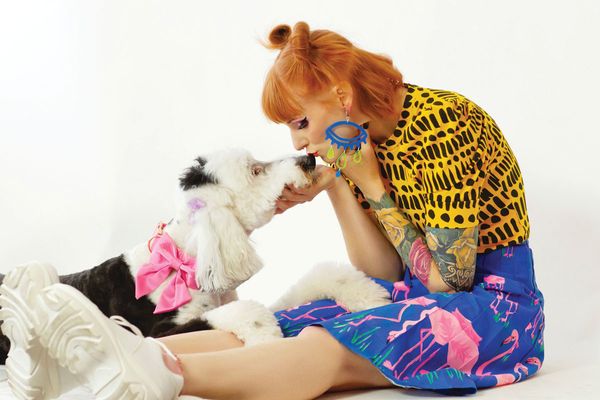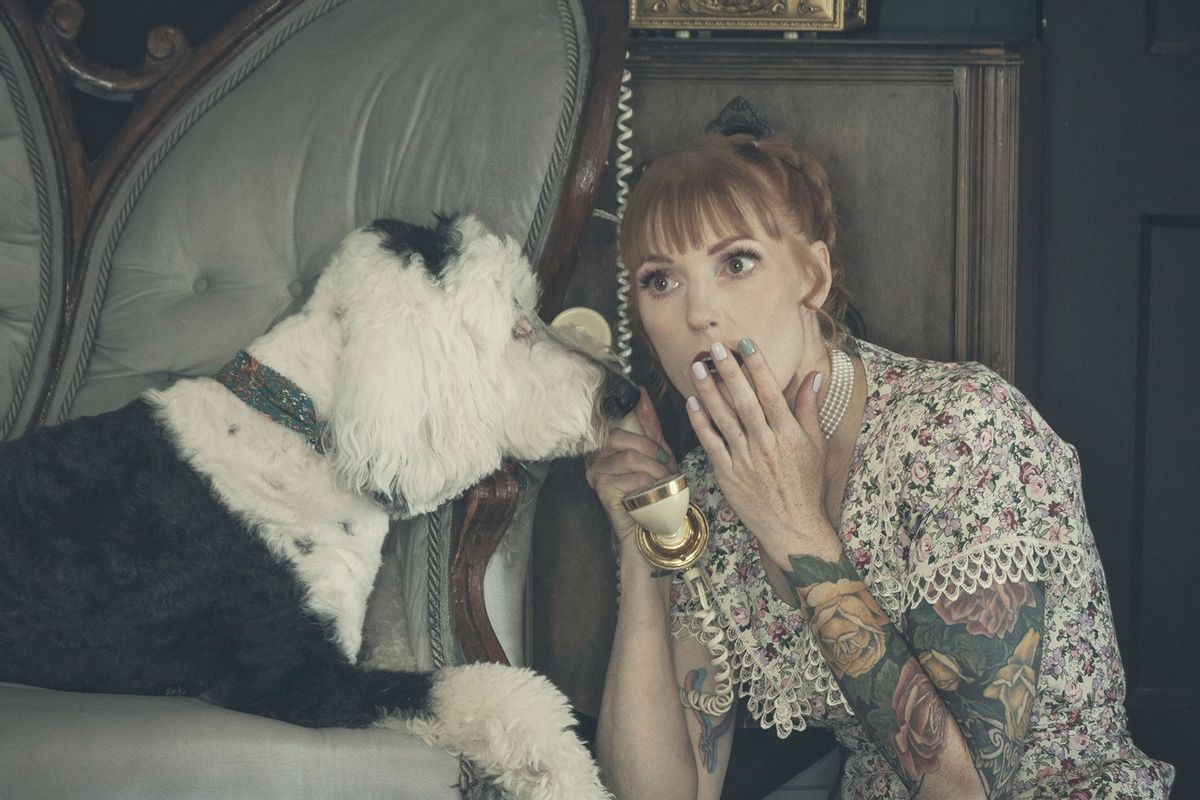In her new book "I Am Bunny: How a 'Talking' Dog Taught Me Everything I Need to Know About Being Human," author and dog trainer Alexis Devine discusses — what else? — the story of her "talking" pet Sheepadoodle, Bunny.
Although Bunny does not literally use her mouth to speak human language, the canny canine has a series of augmentative and alternative communication (AAC) buttons. These giant buttons, which are designed to emit a single word when pressed, were initially designed to help humans with communication disorders. Yet after Bunny was enrolled with thousands of other dogs and cats in a project called "They Can Talk," she began using the AAC buttons to seemingly express complex thoughts.
"Explore canine body language. Look at the things they look at."
Of course, there are scientists who are doubtful about whether Bunny truly understands what she is saying. Even for observers who think Bunny is the real deal, there still remain points of confusion, such as when the dog went viral in a TikTok video after pressing a button saying "Who's this?" while looking at a mirror, then pressing the button for "Help." Many Bunny fans thought the dog had experienced an existential crisis, but as Devine told Salon at the time, the likelier explanation is both simpler — and arguably more thought-provoking.
"I don't think she's actually having an existential crisis," Devine told Salon in an interview. "I think that some people are just now beginning to realize that this isn't just like a fluffy potato that you have in your life — this is a deeply sentient creature that has a lot going on cognitively, that has emotions and that, you know, maybe should be treated more as an equal than as property."
In "I Am Bunny," Devine further explores these themes of animal sentience and animal rights, while also delving into her own personal story. As an autistic person myself, I identified strongly with Devine's discussions of neurodiversity, and was intrigued by how they intersected with her animal-related work.
This interview has been edited for length and clarity.
I want to start with part of the book where you write, "I was officially diagnosed with an autism spectrum disorder in 2020, after many months of deeply relating to articles I read about autistic women and learning as much as I could about neurodiversity." How do you think being neurodivergent shaped your relationship with Bunny?
It's pretty clear in the title itself: "I am Bunny." We share so much and the deeper I went on my learning journey, the more I realized how similar we are as I started to examine these maladaptive coping strategies that she has. As I started to do more and more research, I realized that so much of this journey is about for me as a human understanding who I am and also adapting the environment to create a safe place for myself as someone who is neurodivergent. For Bunny is a dog who, if there were autism in dogs, I would expect that she would be autistic. The closest thing I could find to autism and dogs is called [Canine Dysfunctional disorder].
Want more health and science stories in your inbox? Subscribe to Salon's weekly newsletter Lab Notes.
"After learning about many of these animal language studies, I was left feeling quite sad for a number of reasons."
Do you think that there is something about neurodivergent brains that make it easier for us to communicate and empathize with animals? You mentioned Temple Grandin in your book.
I think for some neurodivergent people, sure. As I'm sure you're aware, we all have special interests and those special interests can vary greatly. I think I do see in neurodivergent women more of this sort of chronic need to connect to non-humans. I guess I don't see that so much in typically-presenting male neurodivergence, but I suppose one can see that anywhere. I think it's just the fact that when we decide to focus on something, we focus so intensely.
And for me in particular, I think this sort of desperate need to connect on a deeper level — because I hadn't really found that in the neurotypical world around me, because I didn't understand myself well enough — really enabled me to connect deeply with Bunny. Because non-humans are completely non-judgmental, right? They take you at who you are, they love you regardless. And that is what I needed in the moment. I think I was really seeking a co-regulation, and although Bunny can't quite be my co-regulation because of the intensity of some of her challenges, I found that I was able to provide some of that co-regulatory... what's the word I'm looking for?
Equilibrium?
Yeah, that's a great word! Yes, for her. And it really helped me examine what I needed in terms of that.
 Alexis Devine and Bunny the Talking Dog (Photo courtesy of author/Harper Collins)
Alexis Devine and Bunny the Talking Dog (Photo courtesy of author/Harper Collins)
Your book mentions the story of a lot of other talking animals like Alex the Gray Parrot or Nim Chimpsky. Are there any stories that particularly resonated with you as the companion of Bunny?
Well, they all resonated with me in the sense that most of the human caretakers of these animals bonded deeply with them and were searching for some larger truth. I think probably that's where the similarities end. After learning about many of these animal language studies, I was left feeling quite sad for a number of reasons. I think first and foremost it was because these were wild animals taken out of their natural habitats and forced to live a human life, sometimes in a lab environment. And they're not dogs.
"That's sort of what existentialism is at its core: deeper exploration and curiosity about what the heck are we doing here?"
Dogs have been evolutionarily selected for their ability to communicate and connect with us. So exploring this type of communication with a dog to me makes a whole lot more sense because they are our natural partners. They live with us, they love us. For centuries, this has been the case. So watching non-humans that don't have those adaptive traits be taken out of an environment in which they are incredibly well-suited and put into ours doesn't feel fair to me.
People often ask whether Bunny is self-aware, but your book makes it clear that she not only is self-aware, she actually has lessons to teach humans. More broadly, what do you think humans can learn from dogs and other animals once we move past asking whether they're self-aware and instead start hearing what they have to say?
I think one of the biggest and most immediate lessons that I learned was active listening. I've always been a good listener, but really trying to understand what Bunny was saying without the buttons became a crucial part of the journey towards adding buttons that would be sort of salient to her experience.
Another huge lesson was empathy, not just for non-humans, but for other humans. And almost most importantly for myself, there have been years and years and years during which I gave myself no grace. I struggled to look myself as a whole being. I felt chronically sort of under-socialized, chronically under-skilled, sort of lost in space with no purpose. And Bunny has given me purpose. I have become a dog trainer because of her and I have learned to really listen and look through the lens of empathy at everything that happens around me.
There are several occasions in the book when you talk about existentialism relative to Bunny. Do you think this existentialist philosophy is specific to Bunny or innate to dogs as a species?
I don't necessarily think Bunny is existentialist. I kind of say that jokingly that she is because the internet went viral with conspiracy theories about her having an existential crisis and losing her mind. I think, more so than anything — like most of us hopefully do — she is simply exploring the world around her with the tools she has. We will probably never know whether she actually believes she's a human or a dog. And to me that doesn't really matter.
Like, she can call herself a human and I can say, okay, whatever, that's fine, because we're still communicating on a deep level. Unless she begins to show severe signs of distress surrounding that specifically, then I wouldn't necessarily call it existentialism. I would just call it exploring her world. And I think that's sort of what existentialism is at its core: deeper exploration and curiosity about what the heck are we doing here? Why is everything the way it is? And who am I?
Of all the advice that you received from Bunny and put in your book, what piece of advice is your favorite?
I think my ability to now say no with ease is one of the most important lessons that she has taught me. I've always had a really hard time saying no. I think that ties into being a high-masking autistic woman. But Bunny in no uncertain terms is very, very clear about her boundaries. The first thing she taught me is how to advocate for her, which was a hard-learned lesson. And the second part of that lesson was how to advocate for myself, which was also a hard learned lesson. But I do so with much greater ease now, and it has saved me a lot of headache and heartbreak.
We need your help to stay independent
What advice do you have for other dog owners based on your experiences with Bunny, if they want to have a deep connection with their companion?
I would say, sit down with your dog. Watch them, listen to them. Explore canine body language. Look at the things they look at. If they smell something, tell them what it is. Label things in their environment when you're walking with them. Let them choose the path. When you are petting them, do consent tests so that they have the option to say no. I think as captive animals in a very human world that isn't naturally designed for them, giving them as much choice and control is the key to a more enriched life for them. So the more we can listen to what they are truly saying, with or without buttons, the stronger our connections will be.



Shares